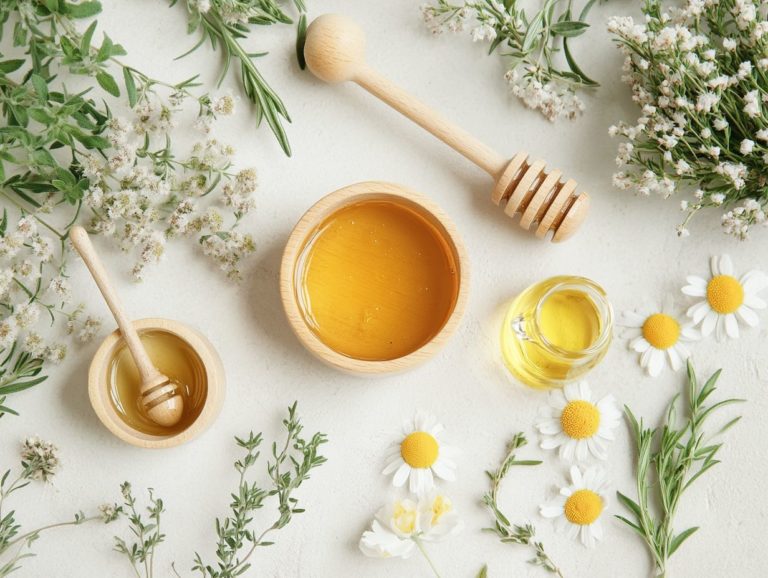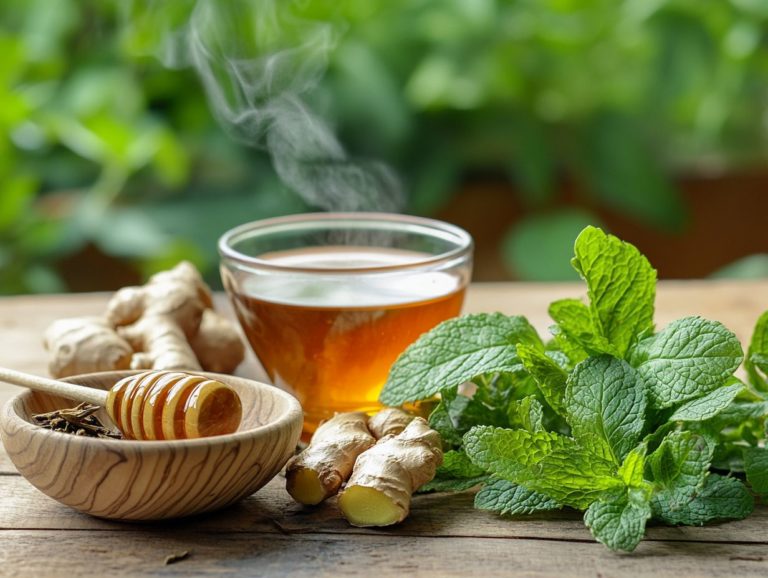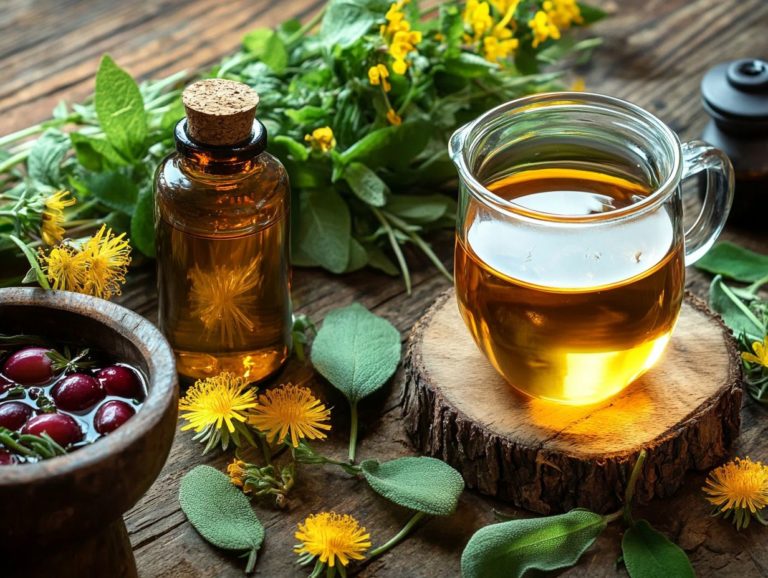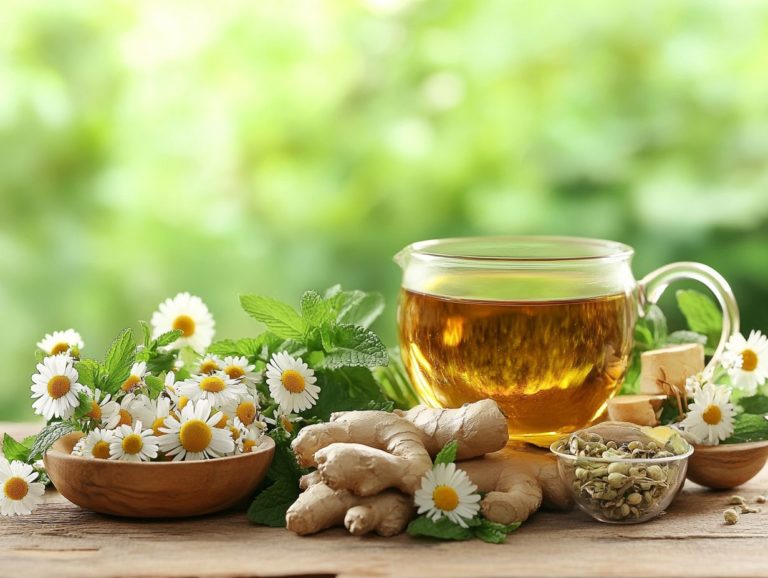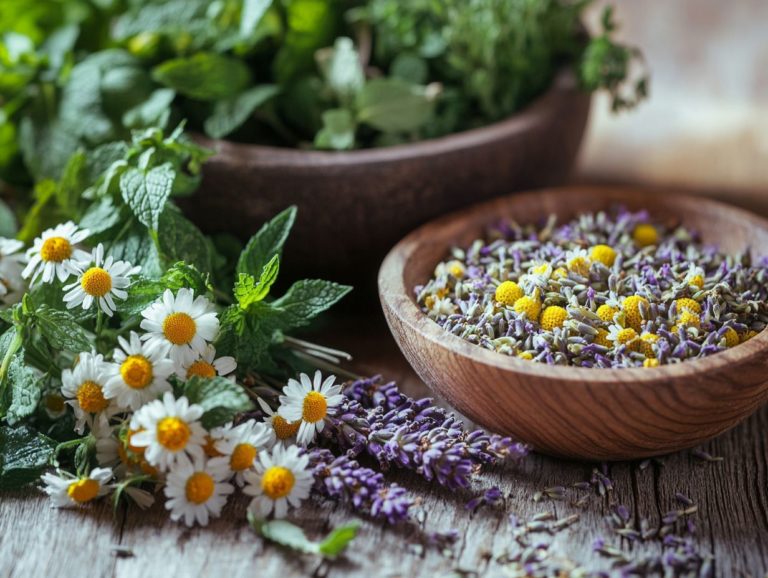Top Herbal Remedies for Skin Allergies
Skin allergies can undeniably be frustrating and uncomfortable, prompting many to search for effective, natural solutions. Fortunately, nature provides a wealth of herbal remedies that can soothe irritation and promote healing.
You ll discover a selection of the top 15 herbal options, ranging from the calming effects of aloe vera to the antimicrobial benefits of tea tree oil. Whether you re grappling with rashes, redness, or itchiness, these herbal allies might just offer the relief you ve been seeking.
Contents
Key Takeaways:

- Aloe vera, chamomile, and turmeric are effective herbal remedies for soothing skin allergies and reducing swelling and irritation.
- Using topical products containing calendula, lavender, or peppermint can help relieve itching and irritation caused by skin allergies.
- Including eucalyptus, witch hazel, or tea tree oil in your skincare routine can help prevent and treat skin allergies due to their anti-inflammatory and antiseptic benefits.
Top Herbal Remedies for Skin Allergies
Skin allergies can present themselves in various forms, such as eczema a condition that causes red, itchy patches on the skin and dermatitis, leading to inflammation and irritation that can considerably disrupt your quality of life. The good news is that there are numerous natural and herbal remedies that can effectively soothe these skin conditions.
Take aloe vera, for example. It s renowned for helping reduce swelling and irritation, delivering instant hydration while helping to reduce redness and swelling. You can apply its gel directly to the affected areas for immediate relief.
Chamomile is another excellent option, known for its calming effects. You can use it in tinctures or teas, letting the cooled infusion soak into a cloth to create a compress that alleviates discomfort on irritated skin.
Then there’s calendula, celebrated for its healing properties. Its creams and oils not only provide moisture but also support skin repair.
Incorporating these remedies into your daily skincare routine whether through topical application or herbal infusions offers a gentle yet effective strategy for managing skin allergies while promoting overall skin health.
1. Aloe Vera
Aloe vera stands as a highly esteemed natural remedy, celebrated for its soothing properties, making it an exceptional choice for addressing various skin irritations and allergies.
This remarkable succulent has been utilized for centuries, not just for its hydrating attributes, but also for its impressive anti-inflammatory effects, which are particularly advantageous in skincare. Research underscores its potential to alleviate symptoms linked to inflammatory conditions such as eczema and dermatitis, with studies revealing significant improvements in individuals who regularly applied aloe vera gel.
Anecdotal evidence further bolsters these claims, with many people noting a decrease in redness and itching after using it. By incorporating aloe vera into your daily routines, whether through gels or creams, you can cultivate healthier skin by calming irritation and promoting a balanced complexion.
2. Chamomile
Chamomile isn t just your go-to herbal tea; it s also a powerful anti-inflammatory agent that can soothe skin reactions tied to allergies.
Chamomile can also be applied topically to tap into its healing properties. The active compounds, like chamazulene and apigenin, work together beautifully to diminish redness and irritation, helping you achieve a clearer complexion.
If you re dealing with conditions such as eczema, psoriasis, or sunburn, you might discover relief through chamomile-infused oils or creams. When sipped as tea, it offers internal benefits, alleviating stress that can exacerbate skin flare-ups.
In essence, chamomile proves to be a versatile ally in both skincare and overall wellbeing.
Don’t wait for the discomfort to worsen try these natural remedies today!
3. Turmeric
Turmeric, the vibrant yellow spice, is renowned for its remarkable ability to reduce swelling and transform your approach to treating skin allergies.
Its active ingredient, curcumin, fights inflammation and offers antioxidant benefits, shielding your skin from damage caused by free radicals. This makes turmeric an outstanding choice for alleviating conditions like eczema or psoriasis.
Incorporate this powerful ingredient into your skincare routine today! Whip up a simple turmeric face mask by mixing one tablespoon of turmeric powder with two tablespoons of yogurt. For a soothing ointment, blend a teaspoon of turmeric with honey and a few drops of olive oil perfect for calming irritated skin.
4. Calendula
Calendula is celebrated for its remarkable skin-soothing properties, making it the ideal remedy for rashes and other allergic skin reactions. This vibrant flower has a rich history in natural skincare, revered for its healing and rejuvenating abilities.
When applied as an oil or extract, calendula effectively calms irritated skin and reduces inflammation and redness. Incorporate calendula oil into your daily skincare routine for instant relief!
Its natural antiseptic qualities help prevent infection, making it a versatile ally against various skin concerns, from minor cuts to persistent irritations.
5. Lavender

Lavender is beloved for its delightful aroma and renowned for its calming effects on skin irritations and allergies. Extracted from the flowers of the Lavandula plant, this essential oil is rich in soothing properties.
When applying lavender essential oil topically, dilute it with a carrier oil (a base oil used to dilute essential oils for safe application) to enhance relaxation and address skin sensitivities. You can use it in diffusers, add it to your baths, or blend it into massage oils for a holistic approach to stress relief.
The gentle scent of lavender eases tension and helps alleviate skin reactions triggered by stress. Enjoy a balanced and tranquil state of being!
6. Peppermint
Peppermint is renowned for its invigorating scent and cooling sensation, making it an excellent choice for reducing swelling in the skin.
When applying it topically, properly dilute peppermint oil with a carrier oil, such as coconut or jojoba oil, at a ratio of 1-2 drops per teaspoon to ensure safety and effectiveness.
Once diluted, gently massage it onto inflamed areas. Users find relief from itching and discomfort, enjoying the delightful tingling sensation it leaves behind as a natural remedy for irritation.
7. Eucalyptus
Eucalyptus oil is celebrated for its soothing properties and effectively alleviates inflammation and irritation linked to skin allergies.
This essential oil is commonly found in cosmetic formulations. Dilute it with a carrier oil before topical application to add versatility to your skincare routine. Its antibacterial and antifungal qualities cleanse the skin and create a protective barrier against environmental toxins.
Users report significant reduction in redness and swelling, resulting in a more even skin tone. The refreshing aroma of eucalyptus oil also uplifts your mental well-being, offering dual benefits for skin health and emotional balance.
8. Witch Hazel
Witch hazel serves as a remarkable natural a substance that tightens skin and anti-inflammatory, making it an excellent remedy to calm irritated skin and support your skin barrier.
Adding witch hazel to your skincare routine soothes your skin, especially if you’re battling blemishes or rashes. Its ability to tighten pores can lead to a more refined complexion. Plus, its gentle nature ensures it’s suitable for all skin types.
If you’re dealing with acne, witch hazel may offer relief by reducing redness and inflammation for a clearer appearance. For those managing rashes, this extract delivers a cooling sensation that alleviates discomfort, helping your skin heal more effectively.
9. Tea Tree Oil
Tea tree oil is celebrated for its remarkable antibacterial and anti-inflammatory properties, making it an invaluable ally in managing skin conditions like acne and allergies.
When you incorporate this essential oil into your skincare routine, it’s crucial to dilute it with a carrier oil, such as jojoba or coconut oil, to minimize any risk of irritation. Many individuals report impressive results in reducing blemishes and redness, thanks to its powerful compounds.
It’s important to perform a patch test to check for any allergic reactions, as some may experience dryness or a burning sensation. By understanding how to use tea tree oil correctly, you can achieve significant improvements in your skin health while ensuring your safety.
10. Neem
Neem stands out as a powerful herb in Ayurvedic medicine, celebrated for its remarkable healing properties that can elevate your skin health.
You can choose from various forms of neem, like oil, powder, and paste, for treating skin allergies and irritations. Applying neem oil directly to affected areas works wonders by soothing inflammation and creating a protective barrier against irritants. For additional relief, consider exploring 5 DIY herbal remedies for seasonal allergies that may complement your treatment.
If you prefer a more textured approach, mix the powdered form with water or yogurt to create a calming face mask that alleviates redness and discomfort. Alternatively, grind fresh neem leaves into a paste and spread it over your skin to enjoy its anti-inflammatory benefits.
Each method provides an effective way to seamlessly incorporate this potent herb into your skincare routine.
11. Oatmeal

Oatmeal stands out as a highly effective natural remedy for soothing itchy skin and addressing various skin conditions.
Oatmeal is amazing because it not only soothes but also gently exfoliates, making it perfect for sensitive skin. With its anti-inflammatory properties, oatmeal creates a protective barrier against irritants, helping to reduce redness and discomfort.
When you incorporate it into baths or apply it topically, your skin can absorb its beneficial nutrients, promoting healing and rejuvenation.
If you’re enthusiastic about DIY skincare, consider crafting oatmeal masks with delightful additions like honey and yogurt. These combinations enhance hydration and amplify the soothing effects, taking your skincare routine to the next level.
12. Licorice Root
Licorice root is an often-overlooked herbal remedy that boasts impressive anti-inflammatory benefits, making it a fantastic choice for addressing various skin irritations.
This remarkable herb is packed with active compounds like glabridin, which soothe redness and irritation while brightening uneven skin tone by inhibiting melanin production. Skincare enthusiasts increasingly gravitate towards products infused with licorice root to tackle dark spots and hyperpigmentation, enhancing overall complexion.
Its antioxidant properties serve as a shield, protecting your skin from environmental stressors and promoting a healthier, more resilient barrier.
By incorporating licorice root into your cleansers, serums, and moisturizers, you can experience nourishing hydration that significantly contributes to a balanced and radiant appearance, making it an invaluable addition to your daily skincare routine.
13. Red Clover
Red clover is a remarkable herb, renowned for its calming properties. It serves as a natural alternative for treating skin conditions linked to allergies. Its impressive blend of isoflavones, antioxidants, and vitamins makes it an excellent choice for soothing irritated or inflamed skin.
If you’re considering integrating this herbal remedy into your skincare routine, applying red clover extract directly to the affected areas can offer immediate relief. You can easily infuse it into your favorite lotions or creams, and if you want to learn how to create herbal skin treatments at home, you can turn your daily skincare rituals into a nourishing treatment.
The gentle nature of red clover not only alleviates skin reactions but also enhances overall skin health. This makes it a valuable ally for anyone dealing with sensitivity or irritation.
14. Stinging Nettle
Stinging nettle is often underestimated. Yet, it serves as a powerful anti-inflammatory agent that can help alleviate skin reactions caused by allergies.
This remarkable herb is packed with vitamins A and C, along with minerals like iron and magnesium. It has been celebrated in herbal medicine for centuries. Not only is it renowned for easing symptoms of hay fever and joint pain, but its benefits extend to skincare as well, including DIY herbal treatments for skin irritations.
Extracts from the leaves can soothe irritated skin, reduce redness, and promote healing. This makes it a favored ingredient in natural ointments and creams. Its ability to boost circulation aids in delivering essential nutrients to your skin, resulting in a healthier, more radiant appearance.
This unique combination of properties truly highlights stinging nettle’s versatility and efficacy. It proves to be a powerhouse you don’t want to overlook.
15. Goldenseal
Goldenseal is a remarkable herb celebrated for its healing properties. It is an invaluable asset in your natural remedies for skin health.
This extraordinary herb is rich in berberine, a compound known for its anti-inflammatory and antimicrobial effects. It can effectively assist in treating various skin conditions such as eczema and dermatitis. You ll love adding goldenseal extracts or tinctures to your routine for targeted relief!
You can also consume goldenseal in the form of capsules or tea to enhance your overall immunity. This is a vital factor in warding off skin infections. Its versatility positions goldenseal as an excellent choice for anyone seeking holistic solutions to elevate their skin s vitality and resilience.
Frequently Asked Questions
What are the top herbal remedies for skin allergies?

Some of the top herbal remedies for skin allergies include aloe vera, chamomile, turmeric, calendula, coconut oil, and lavender.
How does aloe vera help with skin allergies?
Aloe vera has anti-inflammatory and anti-itch properties, making it effective in soothing and relieving symptoms of skin allergies.
Can chamomile help with skin allergies?
Yes, chamomile has natural antihistamine properties that can help reduce inflammation and soothe skin irritation caused by allergies.
What is the role of turmeric in treating skin allergies?
Turmeric contains curcumin, which has powerful anti-inflammatory and antioxidant properties. These can help alleviate symptoms of skin allergies.
How can calendula be used to treat skin allergies?
Calendula has natural anti-inflammatory and antihistamine properties. This makes it useful in reducing skin irritation and soothing allergic reactions.
Is coconut oil effective in treating skin allergies?
Yes, coconut oil has anti-inflammatory and antibacterial properties that can help reduce itching and irritation caused by skin allergies.
If you have more questions about herbal remedies, feel free to ask in the comments or share your experiences! We’re here to help!

